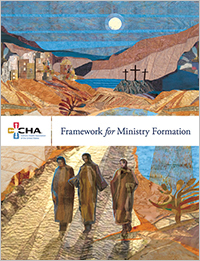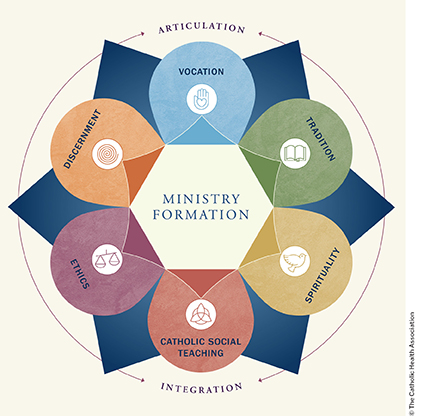BY: DIARMUID ROONEY, MSPsych, MTS, DSocAdmin
"Leaders in Catholic health care have come to recognize the crucial importance of formation in ensuring the Catholic identity of our ministries. In response to member needs, CHA is committed to expanding opportunities for ministry formation and serving as a catalyst to strengthen the Catholic identity of CHA member organizations in carrying out the healing mission of the Catholic Church in the world today."
— SR. MARY HADDAD, RSM
President and Chief Executive Officer
Catholic Health Association of the United States
For over a quarter of a century, CHA has provided resources, programming and education to support the development and formation of ministry leaders. A CHA publication, Framework for Senior Leadership Formation, served for many years as a key guidepost for leadership formation in Catholic health care.
More recently, formation is receiving greater attention as a decisive component to sustain Catholic health care into the future. In the rapidly changing environment of Catholic health care, ministry formation has taken on a new level of importance. Virtually all sponsors and governance leaders of Catholic health systems and facilities have included formation in their strategic priorities in recognition of its critical importance not only for sponsors, boards and senior leaders, but also for those who work at all levels of the organization. In collaboration with the insight and guidance of CHA members, a new Framework for Ministry Formation initiative will address this growing need.
A group of representative members gathered at CHA's St. Louis office to develop the first ministry-wide definition of formation. This included CHA's Formation Advisory Committee; the Foundations of Catholic Health Care Leadership Taskforce; the Sponsor Formation Steering Committee and special guests all with the one purpose of creating this definition. But despite the incredible community effort, on the second day with two hours to go, and so many attempts at a definition on the floor, I finally wrote a note to Sr. Mary. I suggested that we will take all the work — multiple pages of huge sticky notes — and get a subcommittee set up.

But then something extraordinary happened.
Our excellent facilitator Michael Milano quite suddenly split us into two groups, and gently said, "I want you to look at all we have done in prayerful silence, and then I want both groups to write a definition of formation — you have one hour."
Then, as had been our practice, he took both large sheets of paper the two groups had diligently written on, folded them over and put them on the wall. I led us in a prayer of receptivity, and we unfolded them. And they were almost exactly the same! There was an audible gasp in the room, and it took a dear priest in the group to say, "Wow, you do know what just happened?" We did. You could see the look of wonder on the faces of those in the room. With the guidance of the Holy Spirit, we had our definition.
At the recent CHA Pre-Assembly Mission Leader Seminar, we launched the working draft of the Framework for Ministry Formation initiative. This included breaking open the new CHA member collaborative working definition: "Ministry formation creates experiences that invite those who serve in Catholic health care to discover connections between personal meaning and organizational purpose. These connections inspire and enable associates to articulate, integrate and implement the distinctive elements of Catholic health ministry so that it flourishes now and into the future." Along with discussing the definition and working framework of formation, we facilitated an exercise that was very well received. We asked people to complete two sentences: "In my life's work, I serve the purpose of …" and "This connects with my organization's purpose in the following ways …"
Connecting personal meaning with organizational purpose led to some wonderful responses from those at the seminar, including:
"In my life's work now, I serve the purpose of meaning-making, [bringing] the sacred into being in all relationships to facilitate individual, organizational and social transformation. This connects with my organization's purpose in the following ways: it is continuing Jesus's mission of love and healing; it is recognizing the uniqueness and wholeness of each person as made in the image and likeness of God, and that in itself bestows dignity, and the need for social arrangements to be such so as to allow that dignity to unfold – namely the common good; transformation is always for justice, values-based, and for the most poor and vulnerable in our communities."

This led to a deeper dialogue about how ministry formation always aims to be invitational and inclusive, meeting each person where they are in their life journey. It is a dynamic, lifelong, self-reflective process. Building upon the lived experience of the participants, in all formation touchstones (frequent formation opportunities throughout a year) and programs, we support their ongoing growth as persons and leaders in Catholic ministry. Ministry formation inspires participants to consider their calling in a contemplative way, find deeper meaning in their work and realize their gifts as they grow in service to the community and one another. In the process, participants adopt and cultivate behaviors and practices that deepen their personal identity as well as the Catholic identity of the organization.
Without a doubt, effective formation creates a distinctive and inheritable culture. The culture of Catholic ministry is shaped by many components; we believe the following foundational elements capture the multiplicity of ways these components can be expressed: Vocation, Tradition, Spirituality, Ethics, Catholic Social Teaching and Discernment. Participants are invited to understand these distinctive features of Catholic ministry with attention to their expression in the founding communities, so they can personally embody and creatively adapt their integration into ever-changing situations. Leaders bear a critical responsibility for articulating and integrating the heritage and values of the tradition into the organization's culture and for associates. From the beginning, congregations of religious women and men courageously responded to the needs of the communities they were called to serve. Today, through leadership formation, that same call to provide health and hope is being answered by the laity in unique and creative ways, including addressing social determinants of health and providing essential community benefit.
Catholic social teaching insists that the human person is intrinsically social and recognizes that the delivery of health care is a collegial effort. For this reason, formation takes place in community, where participants may gain a sense of belonging to and participating in the Catholic ministry. As associates grasp what is distinctive to Catholic ministry and become comfortable, they find ways personally and professionally to articulate and integrate the dynamics of Vocation, Tradition, Spirituality, Ethics, Catholic Social Teaching and Discernment. Through this process, people grow in their abilities to live out the mission of the organization in a manner that gives witness to Gospel values.
In upcoming columns, we will examine each of the foundational elements of formation in more depth with content and examples of integration and application. I look forward to working with you and hearing your thoughts about the Framework for Ministry Formation initiative for Catholic health care.
DIARMUID ROONEY, MSPsych, MTS, DSocAdmin, is senior director, ministry formation, at the Catholic Health Association, St. Louis.
CHA RESOURCES
Ministry Formation
